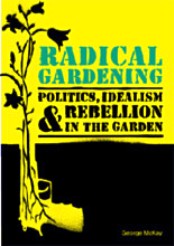 … and comment have appeared widely for the book since its publication in May 2011, in many different international contexts, pleasingly…. A Book of the Year in the Independent on Sunday, and a Guardian Gardening Book of the Year too. From the mainstream to the specialist gardening media, academic journals to the blogosphere, the activist and the lifestyle press. If you want to read the full review text, where available, remember, just click on the hyperlink in the title of each extract below.
… and comment have appeared widely for the book since its publication in May 2011, in many different international contexts, pleasingly…. A Book of the Year in the Independent on Sunday, and a Guardian Gardening Book of the Year too. From the mainstream to the specialist gardening media, academic journals to the blogosphere, the activist and the lifestyle press. If you want to read the full review text, where available, remember, just click on the hyperlink in the title of each extract below.
Initially I was drawn to George McKay’s Radical Gardening because of the compelling title…. My initial question was how can gardening be radical and what does gardening have to do with politics?… After reading the author’s introduction I was quickly drawn into the book largely due to the fact that McKay is a good writer.
By this time I was unable to put the book down. I found the passages dealing with the counterculture in Europe especially interesting…. The images he conveys are powerful and compelling and they reminded me of the idealism of the 1960s….
I began to fully understand the title and implications of this book for future generations. McKay has presented a unique historical perspective on a movement that encompasses many diferent elements and represents power to the people, liberation of women and revitalization of the planet. His writing is very accessible to different levels of readers, thought- provoking, but never preachy…. I finished the book feeling a little more hopeful about the fate of our planet. (Dianne Dentice. 2016; 15(5): 539-540)
Memefest: ‘The Pleasure of Radical Gardening’
When I first saw the theme for this year’s Memefest Friendly Competition, my instant response to the word ‘Pleasure’ was gardening. Not very radical might be one’s first response but for me the pleasure of gardening does lie in its radical ‘roots’. Whether it’s planting indigenous Australian plants, growing organic fruit and vegetables, raising chickens and sharing the bounty with neighbours and friends or saving heritage seeds that can be used again and again, my politics underpins and is underpinned by my gardening….
Gardening is never far away from politics. George McKay’s wonderful book, Radical Gardening: Politics, Idealism and Rebellion in the Garden, traces this relationship, in a mainly British context, by examining the urban allotment movement, the politics of the Garden City, organics, the fascist origins of biodynamics, flower power, peace and memorial gardens, land cooperatives, community gardens and guerrilla gardening. (Lisagye, June 2016)
[Clare Nettle’s] goal [in Community Gardening as Social Action] is to reverse this through greater attention to the agency of individual gardeners, and by recognising their practices as political. Such a summary can only provide a brief outline of community garden discourses, which is perhaps why Nettle over-emphasises the novelty of her focus on collective social action and neglects some parallel work. For example, George McKay (2011) has emphasised the radical history of gardens and gardening more generally…. (Hannah Pitt, 2014; 8(2): 142-144)
One aspect of the politics of green spaces can be framed around sites of horticultural activity. Gardens and parks are many things: sources of livelihood in the form of food production, beautiful spaces that create joy, places to encounter others and venues for outdoor activities (Bellows 2004); not to mention their positive implications on mental health. Traditionally it has been the streets where non-formal politics happens, but parks and gardens are also political spaces, and to highlight this George McKay coined the term “horticountercultural politics”. In his book Radical Gardening, McKay traces the potential he ascribes to urban gardening through the 19th and 20th century until the present day, and points out its potential to incite and accompany both positive and negative social change. McKay organises his argument in a framework that targets the more general struggle around property rights (see also Colding et al. 2013), and explores the motives, challenges and potentials of urban gardening. In his view, ‘counteracting and resistance’ against rigid social doctrines are at the heart of urban gardening’s progressive capabilities. However, dogmatism and xenophobic notions of purification and ‘nature’ represent its most negative characteristics. (Melanie Konrad, ‘On the political potential of urban gardening’, 24 March 2014)
Publication of City Farmers’ Guide is still a bit of time away. We can no longer wait [in Finland]! In the meantime, I would like to introduce a few others more or less have inspired the book…. [George McKay’s Radical Gardening] sheds light on the treatment of all forms of garden history from the social perspective. In what ways is gardening essentially a socially radical, even revolutionary action? Recommended for: the intellectual farmer (Salla, ‘Inspiroivaa kaupunkiviljelykirjallisuutta’, February 3 2013)
George McKay’s eye-opening book unearths the history of politics in the garden … —this is the history of gardening that many don’t speak of. Radical Gardening changed everything I thought I knew and understood about the role of gardening in society. will fire you up, and you’ll be marching out the door ready to occupy your garden. (Ramon Gonzalez, December 12 2012)
George McKay’s book puts gardening and politics together. With limpid beauty. It ranges from the historical origins of people’s struggles over land, the nature of gardening, rights to parks, socialist Utopian communities, the Blut und Boden Wandervögel movements (very critically), Garden Cities, the Counterculture, Peace Gardens, Guerrila Gardening, to Allotments….
Radical Gardening describes, sans fard, the garden as a place of liberty, and as a place where freedom is threatened. A place where liberty trees flourish and where the encroachment of the exploiters menaces.
It is impossible to describe a book of such richness and depth in detail. His grasp takes in Garden Cities, the fight to protest in Hyde Park, Rosa Luxemberg’s gardening in prison, the Kibbo Kith (forerunners of the Woodcraft Folk), the Counterculture journal Gandalf’s Garden, Findhorn, Peace Camps, and the Squatters’ gardens at Tolmers Square London (not quite so wonderful in my memory I must admit). All in clear prose that shows deep research and familiarity with, perhaps the most important point, growing itself.
Now with public space threatened by the ‘Big Society’ – which would like to turn over as much of the common realm to private (‘community’ ) oligarchies – Radical Gardening is a source of reference for all radicals and socialists. As we think of this year’s planting a copy of Radical Gardening is a friend of great strength. And of some of the purest pleasures. (‘Radical Gardening: a socialist appreciation’. Andrew Coates, 7 January 2012)
It is a fascinating history that is quite uncomfortable in places, but I can’t recommend Radical Gardening highly enough for anyone who is interested in why gardening is important in a broader context. It is a fascinating look at a side of gardening that is hardly ever considered: the way gardens have shaped communities, people and their use of the land.
Gardeners who see their work as important and are interested in the broader context of their work as well as historians, and activists will find Radical Gardening a fascinating addition to the Woolly Green Bookshelf. In fact, I’ve found it difficult to put down.
Filed under: Brilliant Books (August 8, 2012)
Flowers in thee dustbin: a blog about the science and art of gardening
This is easiest one of my favourite books. This is the kind of book that makes me excited about gardening. (September 8 2012)
The Age (Melbourne)
… The City of Melbourne recently drew up a ‘draft street gardens policy’ for community-operated gardens on nature strips, footpaths, median strips and the like. Last month it produced the booklet, Sustainable Gardening in the City of Melbourne, which includes a section on planting in laneways ‘for those that have limited space’…. But as British academic George McKay tells it, everyday gardening life has never just been ‘patio, barbecue, white picket fence, topiary, herbaceous border’. In his Radical Gardening, published last year, McKay argues that gardens have always embodied some of ‘society’s most pressing problems and solutions’. Politics, social activism, and the counterculture generally, he says, have all fed into gardening. ‘Though a slow culture, the garden is not fixed, and can change remarkably,’ he writes. ‘I am not thinking season-by-season … I am thinking about its ideology.’ (Megan Backhouse, ‘Beyond the concrete jungle’, 16 June 2012)
… Gardening also thrives in the New Museum’s bookstore, where a display features George McKay‘s primer Radical Gardening: Politics, Idealism and Rebellion in the Garden (2011), which describes the garden as “one of the extreme spaces in the contestation of the cityscape, precisely because of its uncompromising greenness.” McKay covers the waterfront—gardens tended by suffragettes, prisoners of war, and feminists; peace gardens; hippie and punk gardens; a “Pansy Project” for gardening against homophobia—and cites earlier books like Avant Gardening: Ecological Struggle in the City & the World (1999) and Loisaida: NYC Community Gardens (2006).
Out in the streets, there’s a revival of seed bombing in New York, which flourished in the bankrupt ’70s and involves people—one artist describes them as “anarchist city planners”—throwing tennis balls coated with seeds (Liz Christy called them “seed grenades”) into vacant lots and hard-to-access urban sites. Some bombers use clay and compost balls, a technique developed by Masanobu Fukuoka, a Japanese gardener, microbiologist, and philosopher who borrowed from the ancient practice of tsuchi dango, or “earth dumpling.”
But the pivotal element in New York’s art-gardening boom might be the Occupy movement. Because if gardening sounds like the domain of the rich—you need space for a garden, after all—Occupy opened up conversations around the commons (that is, shared resources), food justice, sustainability, and corporate control of seed populations. It also served as a reminder, per McKay’s “contestation of the cityscape,” that there are plenty of vacant lots in the city to be occupied. (Martha Schwendener, ‘Gardening art grows into activism in the Age of Occupy’, 13 June 2012)
… I suspect new kinds of schools may gradually develop. Community level, or linked to radical practices of resistance in other fields. George McKay’s book Radical Gardening is the sort of hybrid I am thinking of. The tenured academic, for the most part, is irrelevant. Its same in the arts. (‘Consuming culture, consuming education’, June 10 2012)
The really interesting thing about the Nazi period is the links with the organic movement. I recommend Radical Gardening by George McKay if you want to follow this up. We tend to think of organic growers as being rather cuddly nice people—you won’t do after reading this! (June 2012)
Stylist magazine
Free radicals: Never knew gardening had a political history? This fascinating book explains all. (no. 126, 16 May 2012, p. 10)
If you have ever looked at gardening as a mere leisure and relaxation activity, and at gardens as places far from ordinary troubles and political struggles, Radical Gardening: Politics, Idealism and Rebellion in the Garden by George McKay is the right book to challenge those ideas. Just forget about the description of the aesthetic pleasantness of multicoloured flower beds and the moral virtues plant care adds to daily people’s life; do not expect any history of the progressive erasure of wilderness from modern cities, or about the art of creating a greener urbanscape. Far from these common interpretations of gardening, McKay proposes an altogether different perspective by exploring the political relevance of gardens and gardening in cities. He tells us a captivating story about the subversive, innovative and creative character of gardening and the role of gardens in western history, with particular focus on Britain and the United States. Specifically, the author offers readers a description of the public politics of gardening as developed, managed and transformed by grassroots movements….
McKay compels us to confront the exciting novelties – as well as some of the uncomfortable consequences – arising from the vibrant political approach pushed forward by radical gardeners. In doing so, he brings us onto the variegated, dynamic and engaging lands where collective history takes form: the public space of gardens, allotments, flowers beds, wastelands and single spots of land. As a well-written romance, Radical Gardening is a book that readers will find difficult to stop reading and that will forever change their perception of urban public green spaces. (Chiara Certomà, ‘Pink patches’, new formations no. 75 (2012), pp. 166-169)
Radical Gardening reveals interesting trends that go beyond the garden fence. Discussing his latest book [at Housmans bookshop, London, in April 2012], McKay pointed out that it his only book to have received a positive review in the Daily Telegraph. The Guardian highly recommends the book. McKay also pointed out that the guerrilla gardening movement and unused land reclaimed as gardens has received praise from the Daily Mail…. But McKay’s book doesn’t just deal with the practical and political activity of gardening. No academic worth their ivory tower could resist analysing the garden as a symbol. McKay … highlights some interesting issues, such as why the red poppy appeal is so successful compared to the use of white poppies for pacifist causes…. Radical Gardening contains lots of interesting actions and creations using gardening to draw attention to all sorts of issues.… (Richard Lemmer, 20 April 2012)
To McKay, gardening is more than the act of growing food. In his new book, he explores three different aspects of gardening: the land, the history, and the politics of cultivation. He traces the roots of political movements, idealism, war, and social criticism and their relation to the home garden. (Therese O’Neill)
Punk and Post-Punk
It does not take the reader long to conclude that, as counterintuitive as it title may appear in contrasting the pastoral and bucolic to subversive politics, there is a good deal of sense to Radical Gardening’s proposition. Notions of liberty, identity and resistance are bound to the garden as roots are to the soil…. McKay seeks not to artificially politicize the craft of the gardener, then, rather to recognize that the process has been in play for centuries…. That spirit of ‘reconnection’ pervades the book….
McKay’s tone is assured without being over-weighty, and admissions of doubt and invitations to further debate, whilst being outside the realm of a formal academic investigation, are to the betterment of the finished book. After all, if we return to the concept of ‘reconnection’, a fusty and detached would have been thematically inappropriate in a book that is broadly evangelical without being hectoring, but also deftly-written, engaging and illuminating. (Alex Ogg, ‘Soiled’, vol. 1:1 (2012), pp. 123-125)
For the latest inspirational garden text published just this year get George Mckay’s Radical Gardening. (Frances Robertson)
Independent On Sunday, Books of the Year
If you thought gardening was a tame and rather bourgeois pursuit, here is a book to make you think again. George McKay traces the ways in which gardening and the garden have been, and remain, central to radical politics, from the Hyde Park riots of the 1860s, through the social utopianism of the garden city movement, the progressive left-wing and reactionary right-wing versions of organic gardening, foreign plants and the politics of immigration, peace gardens, gay gardens, counter-cultural gardens of the 1960s, and up to the ‘guerrilla gardening’ on urban wasteland today. A fascinating and erudite history that made me want to go and cultivate my garden. (Brandon Robshaw, Books of the Year, ‘Vegetable plots, and the red roots of a green revolution’, 11 December)
The Guardian, Gardening Books of the Year
This unusual book looks at the role the garden plays in politics and revolution. George McKay is an academic who specialises in the study of counterculture, and he has turned his gaze on gardening. As well as the more obvious and leftwing, such as environmentalism and garden cities, McKay writes about the affinity the Nazis felt with organic movement. Uncomfortable in places, but hugely thought-provoking. (Lia Leendertz, Weekend 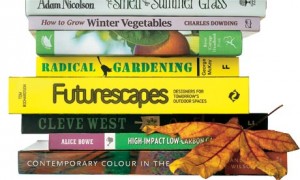 magazine, ‘When the garden sleeps’ [Christmas books article], 10 December 2011)
magazine, ‘When the garden sleeps’ [Christmas books article], 10 December 2011)
11 Books To Give A Gardener for Christmas 2011, no. 1: Radical Gardening. Can a garden-related book change you life? This one has changed mine and how I see the garden and how I relate to it. Published by: Frances Lincoln. Gardener to buy it for: The gardener who hasn’t stopped talking about Occupy Wall Street from the comfort of his computer. (12 December 2011)
Editor’s pick of the books of the year. (December 2011)
MrBrownThumb: ‘Radical Gardening and #OccupyGardens’
After reading this book I’ve come to the realization that my opinion that gardening should be free of the political is myopic to say the least. Gardens and the gardened landscapes are deeply rooted (ugh) in the political. George McKay uses historical examples to illustrate an ‘intimate relationship between politics, social change and landscape or garden’ many of which mirror those taking place today. The chapter on green and open spaces and their uses in protests reminds me of the #OccupyWallStreet movement…. When #OccupyWallStreet took ‘Zuccotti Park’ in Lower Manhattan issues of the park’s ownership, the effect of the protesters on safety and public health were raised echoing the same complaints raised in the book about demonstrators using Hyde Park….
George writes: ‘My hope is that you will find something new here, thought-provoking, inspiring, and that you will experience the sense of excitement I did on learning about the ways the generous space of the garden can have political resonance.’ Radical Gardening has done just that for me. It has opened my eyes and given me new insight into what a garden is and what it can mean, celebrate and how it can be approached. I can’t recommend Radical Gardening more, it is a fascinating look at the way gardens have shaped people, communities, policies and land use. It explores areas such as public parks, Utopian societies, organics and permaculture, community gardens and garden design. (22 November)
Historic Gardens Review
Parts of this book may make your blood boil. Good! Other parts will make you laugh or move you to tears.
Garden Design Journal
This is an exciting and thought-provoking book that cajoles us to understand the context in which gardens are created. The boundaries are narrow—it is interested in counterculture, utopias, and minority voices—but even so, an enormous amount of ground is covered.… It presents a catalogue of dynamic actions and moments in history. But, most astonishing for me, was an account of [gardening] in fascist Germany…. [I]ts tone is always approachable (despite its many footnotes) and its organisation good. My copy is already sticky-noted, underlined, and dog-eared for future reference and more in-depth pursuit. (Pippa Coles Fairnington, 2011)
Kosmos 9: A Global Education Blog
If you like the idea of gardening as a way of protest, you should check out George McKay’s new book Radical Gardening. He collects ways in which activists have used green spots to support their causes and how they have politicized their gardens. (‘Planting protest’, 4 November)
The result of [McKay’s] labors is a short, well-researched, fabulously illustrated, trans-national history of radical gardening. The first and only book on this topic, it will surely be the definitive text on it for years to come. Although he addresses rightwing exploits in the garden, his emphasis is overwhelmingly upon progressive, emancipatory gardens—what he playfully designates as the horticountercultural tradition. He manages to extract a vibrant, oppositional history from an activity often construed as the embodiment of suburban domesticity. This transformed my sense of what gardens can be and, in fact, are. His affirmation that even mundane activities can be a vehicle for utopian aspirations led me to regard the book’s publication as a noteworthy event in its own right. (Chuck Morse, 2 November)
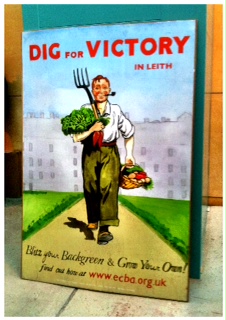 Routes and Roots: Researching Places and Gardens
Routes and Roots: Researching Places and Gardens
This pleasingly digestible book provides a rattle through the history and politics of various gardening activities which tend to the alternative…. George McKay offers a counter-balance to the wealth of accounts of more staid horticultural practices and countless histories of grand, formal gardens of the rich and powerful. His radical places include Hyde Park’s speakers corner, Garden Cities which became home to simple lifers, squats and communes of the 70s and more. We see the history of allotments and community gardens as fights against capitalism and land ownership. Punks, hippies, eco warriors and suffragettes are all there. Some of this will be familiar to those interested in gardening or politics. But there are wild cards like the little told story of peace gardens, nicely allied with the symbolic power of a single flower—the poppy. (Hannah Pitt, 21 September)
News and Perspectives on the Commons
A new British publication, Stir, short for Stir to Action, has released its second issue as editor Jonathan Gordon-Farleigh bravely tries to give voice to a new kind of post-liberal, globally aware activist readership. True to its name, Stir features a number of provocative articles and invigorating interviews with iconoclasts. If we’re lucky, this venture from the edge may actually help assemble a “constituency of unrealistic pragmatists,” in the words of George McKay, author of a wonderful piece on “radical gardening.” (David Bollier, 7 September)
Daily Telegraph
… a highly original history of the harnessing of horticulture in counter-cultural political activism, from the Diggers to the present-day climate change protestors and eco activists.
As one might expect from the professor of cultural studies at Salford University, it is a determinedly Left-wing perspective, peppered with political assumptions and class prejudice. But don’t let that put you off. The meat of this book is compelling, and benefits greatly from the eye of someone from ‘outside’ the gardens world. The author is particularly good on the distinctly dodgy early history of the organic movement…..
Much food for thought here. (Tim Richardson, 27 August)
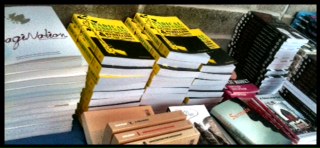 Radical Gardening is a fantastic, in-depth treatment of urban gardening and farming through time, with a particular focus on the UK where McKay is from. In England community gardens are referred to as allotments, dating back centuries and being a genuine artefact of social demands for land to grow food. George McKay dissects the history and practice of community gardens to show the subversive kernel still buried in the plots…. I loved how Radical Gardening, a $20 paperback, takes advantage of new printing technology to include color images throughout the book. It’s a gorgeous, highly readable, and very provocative contribution to the emergent political opposition to 21st century global capitalism. (Chris Carlsson, author of Nowtopia: How Pirate Programmers, Outlaw Bicyclists, and Vacant-Lot Gardeners are Inventing the World Today)
Radical Gardening is a fantastic, in-depth treatment of urban gardening and farming through time, with a particular focus on the UK where McKay is from. In England community gardens are referred to as allotments, dating back centuries and being a genuine artefact of social demands for land to grow food. George McKay dissects the history and practice of community gardens to show the subversive kernel still buried in the plots…. I loved how Radical Gardening, a $20 paperback, takes advantage of new printing technology to include color images throughout the book. It’s a gorgeous, highly readable, and very provocative contribution to the emergent political opposition to 21st century global capitalism. (Chris Carlsson, author of Nowtopia: How Pirate Programmers, Outlaw Bicyclists, and Vacant-Lot Gardeners are Inventing the World Today)
Venue
Fascinating alternative history.
The book moves from a focus on the ‘public and outward-facing politics of gardens” to being ‘more concerned with the grassroots and personal politics of the garden’, which neatly maps the changes in big issue and more societal focussed politics of the early twentieth century to the more personal and behavioural politics of the late twentieth century…. George McKay will be speaking about his book and his views of the role that gardening has played in politics and rebellion. This will be part of the wider Salon discussion entitled ‘Crafts and gardening: the new frontiers of radicalism?‘ on Monday 19 September. (Simon Belt, August 2011)
Working Class Movement Library
… a work which challenges the complacent perception of the garden as a private space filled with decking, non native species and the latest preoccupations of television gardening programmes. The presentation of the land, history and the politics of the garden is done in a lively fashion…. The examination of the ‘polemic landscape’ of the garden in terms of the war memorial & the peace garden is one which is genuinely illuminating…. I should mention the very imaginative use of photographs to accompany the text and the comprehensive endnotes which allow the reader to pick up some of the many threads of the issues presented here. This [book] is worth reading and especially with a view to thinking about gardens more openly and following up some of those important threads. (David Hargreaves, 10 August)
Irish Garden
A challenging read exploring new ways of looking at gardening.
… a bravura account of the power of flowers and the politics of a fertile earth…. McKay, professor of cultural studies at the University of Salford, has written extensively on the do-it-yourself mix of protest, green issues, spontaneous music festivals and contemporary political agitation, from fluffy to spiky, that has defined British counter-cultural movements since they emerged during the 1990s. So there is no better writer to tackle the thorny issue of agitprop down by the potting shed. He rolls his sleeves up and goes to it with gusto…. It is not only expertly written but written with the type of bravura that only someone on the inside of a movement they care about could achieve…. a truly important book that fills a gap between the overt political action of immediate protest and the slow cultural protest, both ecological and environmental, that might bring about the deep structural change in society envisioned by many small steps that begin with the planting of a tree or the laying out of a park on wasteland. (Clive Bloom, July 15)
BBC Gardens Illustrated
How radical is your allotment? More than you might think, if George McKay is to be believed…. Radical Gardening is a stimulating and enjoyable read. (Christopher Stocks, July 2011, 201)
Farm Together Now (USA)
[McKay] discusses land, property ownership, environmentalism and community building in a rich historical context they are rarely presented in. (Tucker, June 17)
Nerve 18 (promoting grassroots arts and culture on Merseyside)
Recommended read, summer 2011. (Mandy Vere)
Left Bank Books Collective, Seattle WA
Recommended summer reading. Collective member Alana says: ‘As an avid gardener and food politics nerd, I am really looking forward to what this book has to say’.
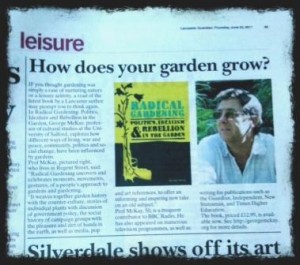 RIBA Journal (magazine of Royal Institute of British Architects)
RIBA Journal (magazine of Royal Institute of British Architects)
From Bourneville to seed bomb: a lightness of touch and a sprinkling of plant puns make inspiring cultural gallop through an alternative history of green in the city. (Editors’ choice, Eleanor Young, June 2011)
University of Washington Botanic Gardens, Elisabeth C. Miller Library
Don’t be put off by the crude cover art: McKay offers thoughtful discussion based on his extensive research into the role of public and community gardens, the politics of the organic movement and its offshoots (biodynamics and permaculture), gardens of peace and war, and the many ways in which gardens and open space have figured into politics, society, and culture. McKay enjoys wordplay (remember that ‘radical’ is rooted!), coining the term ‘horticounterculture’ to describe gardening-related movements which represent activism and resistance, as well as utopian (or dystopian) visions.
Of local note: McKay cites Professor Linda Chalker-Scott’s debunking the pseudo-scientific underpinnings of biodynamics (a philosophy of agriculture developed by Rudolf Steiner, whose views held some appeal for National Socialists). Seattle is also noted briefly in a list of cities with an active community garden movement. (Rebecca Alexander, June 2011)
British author George McKay traces the development of gardening over time, busting the myth of the garden as a confined and manicured output of suburbia and talking about its political and countercultural implications. Included is an exploration of the role of Quakers and other radicals like the “diggers” in early thought about agriculture. McKay also discusses the idealized agricultural spaces created by Quaker and other industrialists as a space for factory workers. McKay’s book is an in-depth and novel exploration of the garden space over time, whether idyllic or rebellious. (May 25 2011)
War, peace and politics. None of these things usually spring to mind when we think about gardening, but look a little closer at the nation’s favourite pastime and you’ll find that gardens have long been hotbeds of radical ideologies, political struggle and social change.
This little-considered side of gardening is the subject of a new book by Professor George McKay of Salford University. In Radical Gardening, he guides us through an alternative garden history. Glasgow-born McKay has experience of social change and gardening–the arrival of the motorway in the 1960s meant most of his family was moved out to the city’s edge. ‘In Easterhouse I do remember as a boy clumsily spilling a packet of seeds in my granny’s garden, feeling I’d failed, then coming back a few months later to be amazed by the splash of colour in that exact spot’, he says.
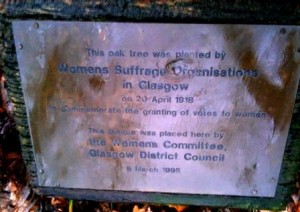
It’s our public parks that first come under the microscope in Radical Gardening. McKay shows how these parks have been the sites of political protests, from the working-class Londoners demanding the vote who tore up Hyde Park’s railings in 1866 to the environmental activists in Pollok Park[, Glasgow] in 1994, squatting in treehouses in protest against the proposed building of the M77 motorway through the park….
So if you’ve been labouring under the delusion that gardening is a staid suburban pastime, this is the book that will change your mind. (Louisa Pearson, 9 May 2011)
Ham & High
A fascinating exploration of the many ways in which gardening, land use, environmental conservation, methods of cultivation, etc. are shot through with politics.
Publishers Weekly (USA)
Even before Voltaire advised that we escape the complexity and tumult of life by cultivating the garden, it had been thought of as place of refuge and gardening as a purely private activity. In this social history, British cultural critic George McKay (Circular Breathing) argues persuasively that gardening is not an ideology-free zone. Both the progressive left and the reactionary right have used the garden as a means to political ends. In the current age, when facile thinking and cynical marketing make it is easy to confuse organic produce with moral virtue, it is valuable to be reminded by McKay that the Nazi regime promoted organic farming as a means to stimulating dangerous German nativism. McKay also provides a richly detailed guide to how politics have shaped utopian garden cities, public memorial gardens, community allotments, and guerrilla gardening…. (18 April 2011)
Library Journal (USA)
This is an eye-opening alternative study of agricultural, national, political, and social movements from around the world that are intrinsically linked to gardening. McKay (cultural studies, Univ. of Salford, England; Senseless Acts of Beauty: Cultures of Resistance Since the Sixties) highlights forgotten connections between radical movements of the past and environmental trends of today. He traces three intertwined meanings of the garden plot—the land, history, and politics—while discussing peace gardens, military and victory gardens, urban and rural gardens, and community gardens, allotments, and guerrilla gardening, among other topics. McKay notes the strong links between fascism and the organic movement in Britain and Germany and parallels the Garden City Movement of the early 20th century and fair trade environmentalism of  today. His aim “to trace strands of idealism, rebellion, political action and social criticism in the garden historically and presently” is admirably achieved. The book is richly illustrated with photographs, posters, flyers, magazine covers, and drawings that capture the hands-on essence that, ultimately, is the fundamental stuff of gardening. VERDICT Highly recommended for gardeners interested in the broader context of their work, historians, and activists. (Donna L. Davey, New York University Library, 15 April 2011)
today. His aim “to trace strands of idealism, rebellion, political action and social criticism in the garden historically and presently” is admirably achieved. The book is richly illustrated with photographs, posters, flyers, magazine covers, and drawings that capture the hands-on essence that, ultimately, is the fundamental stuff of gardening. VERDICT Highly recommended for gardeners interested in the broader context of their work, historians, and activists. (Donna L. Davey, New York University Library, 15 April 2011)
This book was published with the support of a small grant from the Stanley Smith (UK) Horticultural Trust.
